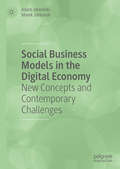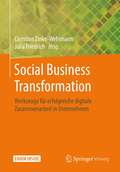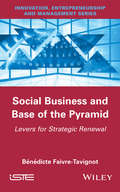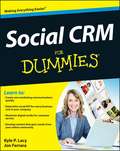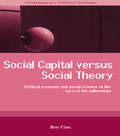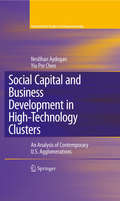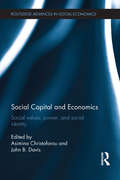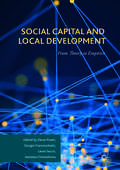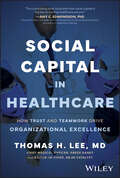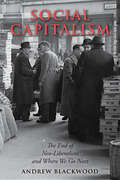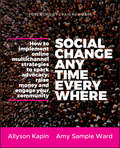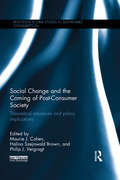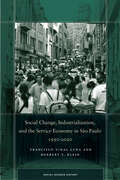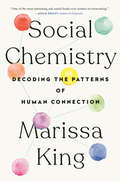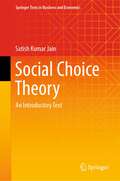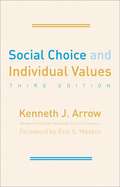- Table View
- List View
Social Business Models in the Digital Economy: New Concepts and Contemporary Challenges
by Adam Jabłoński Marek JabłońskiFilling a gap in the current literature, this book addresses the social approach to the design and use of innovative business models in the digital economy. It focuses on three areas that are of increasing importance to businesses and industry today: social issues and sustainability; digitization; and new economic business models, specifically the sharing and circular economies. The authors aim to solve current scientific concerns around the conceptualization and operationalization of social business models, addressing management intentions and the impact of these models on society. Based on observation of social phenomena and the authors' research and practical experience, the book highlights best practices for designing and assessing social business models.
Social Business Transformation: Werkzeuge für erfolgreiche digitale Zusammenarbeit in Unternehmen
by Julia Friedrich Christian Zinke-WehlmannDie Zukunft der Arbeit verlagert sich zunehmend in den digitalen Raum. Deutsche Unternehmen positionieren sich in der Gestaltung dieses Raumes bislang häufig in der Rolle der Nachzügler, weil sie die Bedeutung des Einsatzes sozialer Technologien (z.B. Enterprise Social Networks) für das Unternehmen unterschätzen. Das resultierende Risiko im globalen Wettbewerb unterzugehen, ist gerade für den Mittelstand erheblich.Um zukunftsfähige Wege einzuschlagen, braucht es neue Gestaltungsansätze. Einer davon ist Social Business. Social Business wird im vorliegenden Werk als ganzheitliches Konzept beschrieben, welches durch den systematischen Einsatz digitaler und kollaborativer Werkzeuge neue Möglichkeiten der Innovation und Wertschöpfung schafft. Soziale Technologien ermöglichen eine proaktive Gestaltung unternehmensinterner und -übergreifender Prozesse und bieten insbesondere im Wissensmanagement, in der Kommunikation sowie der Zusammenarbeit produktionssteigernde Potenziale.Im Rahmen dieses Werkes werden praktische Anwendungen, Konzepte zur Umsetzung von Social Business und Leitlinien für den Transformationsprozess wissenschaftlich fundiert und praxisnah präsentiert.
Social Business and Base of the Pyramid
by Bénédicte Faivre-TavignotThis book analyzes how social business and base of the pyramid approaches allow companies to reinvent themselves, or in other words how they are the levers for strategic renewal. It highlights the constraints and possible difficulties encountered in the process of corporate renewal, drawing on individual and collective restraints to outline the key themes for a company's successful transition. The author uses the case of Danone to explain how such a process of strategic renewal can take time and calls for a shared vision not only among the directors but between all the players, with a strong emphasis on long-term commitment. Throughout this book, the author offers guidance to help others complete this process with success, encouraging the reader to seize opportunities for change.
Social Business at Novartis: Arogya Parivar
by David Lane Michael E. Porter Mark R. KramerLate in 2013, Novartis CEO Joseph Jimenez was considering whether or how to deepen the company's investment in Arogya Parivar, its profitable program that sold Novartis medicines in rural India while expanding access to medicine and health information to millions of Indian villagers.
Social CRM For Dummies
by Stephanie Diamond Kyle Lacy Jon FerraraDiscover great ways to engage your customers through the social webSocial CRM is an evolving tool to help you engage your customers, interact with them, and develop deeper relationships. This handy guide teaches you how to make the most of it, whether your business is a small shop or a large corporation. In a friendly, easy-to-understand style, it explains how you can create new marketing communications and develop smart, applicable content that produces results from your online community. You'll learn to use data to drive results, create social Key Performance Indicators for different business units, and a great deal more.Today's consumer uses technology to select relationships with companies; this book teaches business owners how to use social CRM to create relationships that customers want to maintainExplains how to integrate social media into your CRM mix Shows how to use data and information gathered through social sites Helps you develop social KPIs and create content that gets results from your online communitySocial CRM For Dummies helps businesses large and small use social media to develop and maintain productive customer relationships.
Social Capital Versus Social Theory (Routledge Studies in Contemporary Political Economy)
by Ben FineThe idea of Social Capital is an attempt to incorporate social considerations into mainstream economic thinking. Its proponents feel that social factors are properly quantifiable. So, they use the compex algebra and statistics beloved of mainstream economic theory and measure 'units' of health care or education in the same way that they would machinery or transport.Ben Fine's main argument in this book is that such concers cannot be judged in terms of mathematical methods and that to try t odo so is overly simplistic.Fine assesses the impact of Social Impact across the social sciences and shows how economic analysis is being subsumed into these areas and how thinking in sociology and politics impacts upon economics.
Social Capital and Business Development in High-Technology Clusters
by Yiu Por Chen Neslihan AydoganThe economics of regional clusters, where business formation, technological innovation, and the emergence of a highly-skilled labor force converge, has become a popular topic. This fascinating book applies a variety of tools and models to analyze, in depth, the formation and growth of high-tech clusters. It does this first by exploring the institutional forces that promote the failure or success of such agglomerations, and then by focusing on the dynamics of the labor force.
Social Capital and Economic Development (Fundamentals Of Development Economics Ser.)
by Patrick FrancoisThis immensely readable book by Patrick François provides an original insight into the increasingly fashionable topic that is social capital. In a unique, original study, the author emphasises trustworthiness as a vital feature of social capital and argues that standard economic treatments of this phenomenon are inadequate. The book's richer
Social Capital and Economics: Social Values, Power, and Social Identity (Routledge Advances in Social Economics)
by John B. Davis Asimina ChristoforouThis volume provides a collection of critical new perspectives on social capital theory by examining how social values, power relationships, and social identity interact with social capital. This book seeks to extend this theory into what have been largely under-investigated domains, and, at the same time, address long-standing, classic questions in the literature concerning the forms, determinants, and consequences of social capital. Social capital can be understood in terms of social norms and networks. It manifests itself in patterns of trust, reciprocity, and cooperation. The authors argue that the degree to which and the different ways in which people exhibit these distinctively social behaviours depend on how norms and networks elicit their values, reflect power relationships, and draw on their social identities. This volume accordingly adopts a variety of different concepts and measures that incorporate the variety of contextually-specific factors that operate on social capital formation. In addition, it adopts an interdisciplinary outlook that combines a wide range of social science disciplines and methods of social research. Our objective is to challenge standard rationality theory explanations of norms and networks which overlook the role of values, power, and identity. This volume appeals to researchers and students in multiple social sciences, including economics, sociology, political science, social psychology, history, public policy, and international relations, that employ social capital concepts and methods in their research. It can be seen as a set of new extensions of social capital theory in connection with its themes of social values, power, and identity that would advance the scholarly literature on social norms and networks and their impact on social change and public welfare.
Social Capital and Local Development
by Asimina Christoforou Elena Pisani Giorgio Franceschetti Laura SeccoThis book addresses the role of social capital in promoting rural and local development. The recent financial and economic crises have exposed the European Union (EU) to an increased risk of social exclusion and poverty, which are now at the heart of its economic, employment and social agenda with explicit reference to rural and marginal areas (Europe 2020). The authors' work from the notion that rural development is not imposed from the 'outside', but depends also on endogenous factors, namely local cultural and ecological amenities, eco-system services, and economic links with urban areas which expand rural opportunities for innovation, competitiveness, employment and sustainable development. Social capital is of paramount importance because it helps build networks and trusting relations among local stakeholders in the public and private spheres, and supporting the enhancement of governance of natural resources in rural areas
Social Capital and Sport Organisations (Routledge Research in Sport, Culture and Society)
by Richard TaconDrawing on primary research within voluntary sports clubs in the UK and secondary analysis of the wider international literature on social capital, this text focuses on the micro-processes of social capital development and how they play out in specific social settings. In so doing, it adds to existing research by developing a rich, contextualised, process-based view of social capital in action. Critically reviewing theoretical and empirical literature on social capital, the book highlights the key current debates. The empirical core of the book draws on ethnographic observation over 18 months at voluntary sports clubs in the UK, including in-depth interviews with sports club members and organisers. The text explicitly seeks to set this empirical work in its wider context, by considering the findings in relation to other international studies of social capital in both sports clubs and other types of organisation. The book draws on international research from a whole range of countries: UK, USA, Australia, Canada, Norway, Denmark, Netherlands, Japan, Vanuatu, Czech Republic, Germany, and many others. The book establishes a transferable, process-based understanding of how social capital develops – both within sports clubs and beyond. This is an illuminating reading for policymakers, practitioners, and researchers with an interest in the sociology of sport, sport development, sport management, sport policy, social theory, social policy, or social networks.
Social Capital in Healthcare: How Trust and Teamwork Drive Organizational Excellence
by Thomas H. LeeHarness the power of social capital to improve the efficacy and efficiency of healthcare organizations Written by Thomas Lee, Chief Medical Officer at Press Ganey, Social Capital in Healthcare describes a new and powerful framework for improving healthcare, arguing that managers should approach the work of building trust, teamwork, and high reliability with the same intensity and discipline as CFOs use when managing the finances of their organizations. Lee's powerful framework integrates management priorities such as safety, quality, patient experience, and workforce resilience/burnout/loyalty, demonstrating through data that these “silos” are in fact intertwined, and the work of improving them is best taken on with a single focus: improving social capital. In this book, readers will learn about: Key social capital themes in healthcare, including trust, respect, connectedness, and teamwork The necessity of social capital in healthcare due to changes in medicine, patients, and society Building social capital through transitivity, reciprocity, bridging connections, and driving the right values Social capital initiatives at institutions such as the Mayo Clinic, Houston Methodist, and Vanderbilt University Medical Center Drawing upon deeply respected work from sociology, psychology, and business strategy, Social Capital in Healthcare earns a well-deserved spot on the bookshelves of all forward-thinking healthcare executives, managers, and consultants.
Social Capital, Corporate Social Responsibility, Economic Behaviour and Performance
by Lorenzo Sacconi Giacomo Degli AntoniThis book brings together an interdisciplinary group of leading experts to examine three major concepts: social capital, socially responsible behavior of economic agents and economic development. The volume studies the interplay of these issues by employing two original approaches. A micro perspective based on behavioural economic theory and game theory, focusing in particular on the relationship between social capital and corporate social responsibility (CSR) and how these support the creation of self-sustaining networks of cooperative relations. In addition to this, it provides a macro perspective on the relationship between social capital, norms of ethics and economic development. Part I concerns new perspectives on the economic theory of institutions and explains CSR in terms of reciprocity, social preferences and conformity to social norms. Part II presents the approach to social capital and CSR based on behavioral game theory and network analysis. Part III illustrates experimental and empirical evidence concerning the economic effects of social capital and other-regarding preferences. Part IV discusses the macro approach to social capital and sustainable economic development. This book is an essential reading for all interested in social capital, corporate social responsibility, economic development and their mutual relationships as they are seen through the lens of the economic theory of institutions, behavioral economics and game theory. "
Social Capital, Trust and the Industrial Revolution: 1780-1880 (Routledge Explorations In Economic History Ser.)
by David SunderlandThe first text to examine the concept of trust and the role that it played on the Industrial Revolution, this book is a key resource for students studying nineteenth century British history as well as historically minded sociologists.Analytical in style and comprehensive in approach, Social Capital, Trust and the Industrial Revolution covers a ran
Social Capitalism: The End of Neo-Liberalism and Where We Go Next
by Andrew BlackwoodIs Capitalism doomed; how long is its shelf-life? Can its promise of prosperity and the ‘good life’ be sustained? Have stories of its impending demise been exaggerated? If some soothsayers are to be believed it has been on a downward slippery slope at least since the financial crash over a decade ago, so that its days may well be numbered. This work analyses the place of the free market economy in modern society, distinguishes between neo-liberalism and traditional capitalism, and comes to quite different conclusions – as much for reasons of perception as for socio-economic realpolitik. But in the process some important conceptual myths need to be demolished: about the misunderstood role of the individual in modern society, about the absurdity of focusing on economic growth, about the unsustainability of current social inequalities and how they can be overcome, about the mirage of social mobility and the future of work. These issues can only be appreciated in their historical context – currently a yawning gap in any discussion of our current predicament. Suggestions are put forward as to how a reformed, ‘social’ capitalism would better serve the interests of the economy, the community and the individual – in a world where we must learn to consume less, travel less, and yes, work less – with the ultimate goal of greater dignity and justice for all.
Social Care Management, Strategy and Business Planning
by Trish Hafford-LetchfieldSocial Care Management, Strategy and Business Planning is a comprehensive guide to strategic social care management, covering all the knowledge and skills that managers in the 21st century must have, and showing how to make theory a practical reality. The book aims to make business planning a more accessible and user-friendly process, offering practical advice on how to tackle the everyday tasks which good social care management should involve. Topics covered include strategic planning, business development, commissioning and contracting, project management, decision-making, risk, and evaluation techniques. The book also acknowledges the challenges of working collaboratively within a complex legislative and policy framework and juggling different aspects of the management tasks whilst retaining professional identities and ethics. Also included are practical examples and lively tips and comments from practising managers on their experiences in different areas of business planning. This book will be essential reading for anyone involved in managing or leading practice either in the front line or at a more strategic level. It will be useful to post-qualifying social work students and is particularly valuable to anyone following a management training programme.
Social Change Anytime Everywhere
by Amy Sample Ward Allyson KapinStrategies for advocacy, fundraising, and engaging the communitySocial Change Anytime Everywhere was written for nonprofit staff who say themselves or are asked by others, "Email communications, social media, and mobile are important, but how will they help our nonprofit and the issues we work on? Most importantly, how the heck do we integrate and utilize these tools successfully?" The book will help answer these questions, and is organized to guide readers through the planning and implementation of online multi-channel strategies that will spark advocacy, raise money and promote deeper community engagement in order to achieve social change in real time.It also serves as a resource to help nonprofit staff and their boards quickly understand the evolving online landscape and identify and implement the best online channels, strategies, tools, and tactics to help their organizations achieve their missions.
Social Change and the Coming of Post-consumer Society: Theoretical Advances and Policy Implications (Routledge-SCORAI Studies in Sustainable Consumption)
by Maurie J Cohen Halina Szejnwald Brown Philip J VergragtConsumer society is an unquestionably complex social construct. However, after decades of unremitting dominance there are signs emerging that it is starting to falter, both as a coherent and durable system of social organization and as a strategy for societal advancement. Debates concerning how we can transition beyond present energy- and materials-intensive consumer society are beginning to gain greater salience. Social Change and the Coming of Post-Consumer Society aims to develop more complete appreciation of the relevant processes of social change and to identify effective interventions that could enable a transition to supersede consumer society. Bringing together leading interdisciplinary experts on social change, the book identifies and analyzes several ongoing small- and modest-scale social experiments. Possibilities for macro-scale change from the interlinked perspectives of culture, economics, finance, and governance are then explored. These contributions expose the systemic problems that are emblematic of the current condition of consumer society, specifically the unsustainability of prevailing consumption practices and lifestyles and the persistence of inequalities. These observations are summarized and extended in the final chapter of the book. This volume will be of great interest to students and scholars of sustainable consumption, sustainability transitions, environmental sociology, and sustainable development.
Social Change in the Industrial Revolution: An Application of Theory to the British Cotton Industry
by Neil J. SmelserFirst Published in 2005. Routledge is an imprint of Taylor & Francis, an informa company.
Social Change, Industrialization, and the Service Economy in São Paulo, 1950-2020 (Social Science History)
by Herbert S. Klein Francisco Vidal LunaIn the 1950s–80s, Brazil built one of the most advanced industrial networks among the "developing" countries, initially concentrated in the state of São Paulo. But from the 1980s, decentralization of industry spread to other states reducing São Paulo's relative importance in the country's industrial product. This volume draws on social, economic, and demographic data to document the accelerated industrialization of the state and its subsequent shift to a service economy amidst worsening social and economic inequality. Through its cultural institutions, universities, banking, and corporate sectors, the municipality of São Paulo would become a world metropolis. At the same time, given its rapid growth from 2 million to 12 million residents in this period, São Paulo dealt with problems of distribution, housing, and governance. This significant volume elucidates these and other trends during the late twentieth and early twenty-first centuries, and will be an invaluable reference for scholars of history, policy, and the economy in Latin America.
Social Character and the Life Cycle: Why Personality Should Matter to Leaders
by Michael MaccobyIn this chapter, the author contrasts the development of bureaucratic and interactive social characters from infancy to old age. By observing this development, we gain a richer understanding of how emotional attitudes have changed and what this means for leaders, followers, and collaborators.
Social Chemistry: Decoding the Patterns of Human Connection
by Marissa KingNext Big Idea Club Nominee Fall 2020Social Chemistry will utterly transform the way you think about &“networking.&” Understanding the contours of your social network can dramatically enhance personal relationships, work life, and even your global impact. Are you an Expansionist, a Broker, or a Convener? The answer matters more than you think. . . . Yale professor Marissa King shows how anyone can build more meaningful and productive relationships based on insights from neuroscience, psychology, and network analytics. Conventional wisdom says it's the size of your network that matters, but social science research has proven there is more to it. King explains that the quality and structure of our relationships has the greatest impact on our personal and professional lives. As she shows, there are three basic types of networks, so readers can see the role they are already playing: Expansionist, Broker, or Convener. This network decoder enables readers to own their network style and modify it for better alignment with their life plans and values. High-quality connections in your social network strongly predict cognitive functioning, emotional resilience, and satisfaction at work. A well-structured network is likely to boost the quality of your ideas, as well as your pay. Beyond the office, social connections are the lifeblood of our health and happiness. The compiled results from dozens of previous studies found that our social relationships have an effect on our likelihood of dying prematurely—equivalent to obesity or smoking. Rich stories of Expansionists like Vernon Jordan, Brokers like Yo-Yo Ma, and Conveners like Anna Wintour, as well as personal experiences from King's own world of connections, inform this warm, engaging, revelatory investigation into some of the most consequential decisions we can make about the trajectory of our lives.
Social Choice (Routledge Revivals #Vol. 1)
by Bernhardt LiebermannFirst published in 1971, Social Choice is both a text and reference containing the proceedings of a conference dealing with contemporary work on the normative and descriptive aspects of the social choice problem. This reissue will be of interest to advanced undergraduate and graduate courses on group decision making and social choice. Economists, social psychologists, political scientists and sociologists will welcome this valuable work.
Social Choice Theory: An Introductory Text (Springer Texts in Business and Economics)
by Satish Kumar JainThis introductory textbook on social choice theory makes the social choice theoretic framework and its main results, that have a direct bearing on the discourses on electoral rules and policy evaluation, accessible to a larger audience. The text is essentially self-contained. No previous knowledge of mathematical logic or relational algebra is assumed. Whatever technical prerequisites are needed, are developed in the text itself. Although the text is at an introductory level, there has been no compromise on rigor. Unlike most introductory books, the relevant proofs are not omitted; rather, they have been explained in detail. The text has a large number of examples so that the concepts and results become clear to the reader. There is a large number of exercises with full solutions provided at the end of the text, so that the reader can check her/his understanding of the material.
Social Choice and Individual Values
by Kenneth J. Arrow Eric S. MaskinOriginally published in 1951,Social Choice and Individual Valuesintroduced “Arrow’s Impossibility Theorem” and founded the field of social choice theory in economics and political science. This new edition, including a new foreword by Nobel laureate Eric Maskin, reintroduces Arrow’s seminal book to a new generation of students and researchers. "Far beyond a classic, this small book unleashed the ongoing explosion of interest in social choice and voting theory. A half-century later, the book remains full of profound insight: its central message, ‘Arrow’s Theorem,’ has changed the way we think. ”—Donald G. Saari, author ofDecisions and Elections: Explaining the Unexpected
